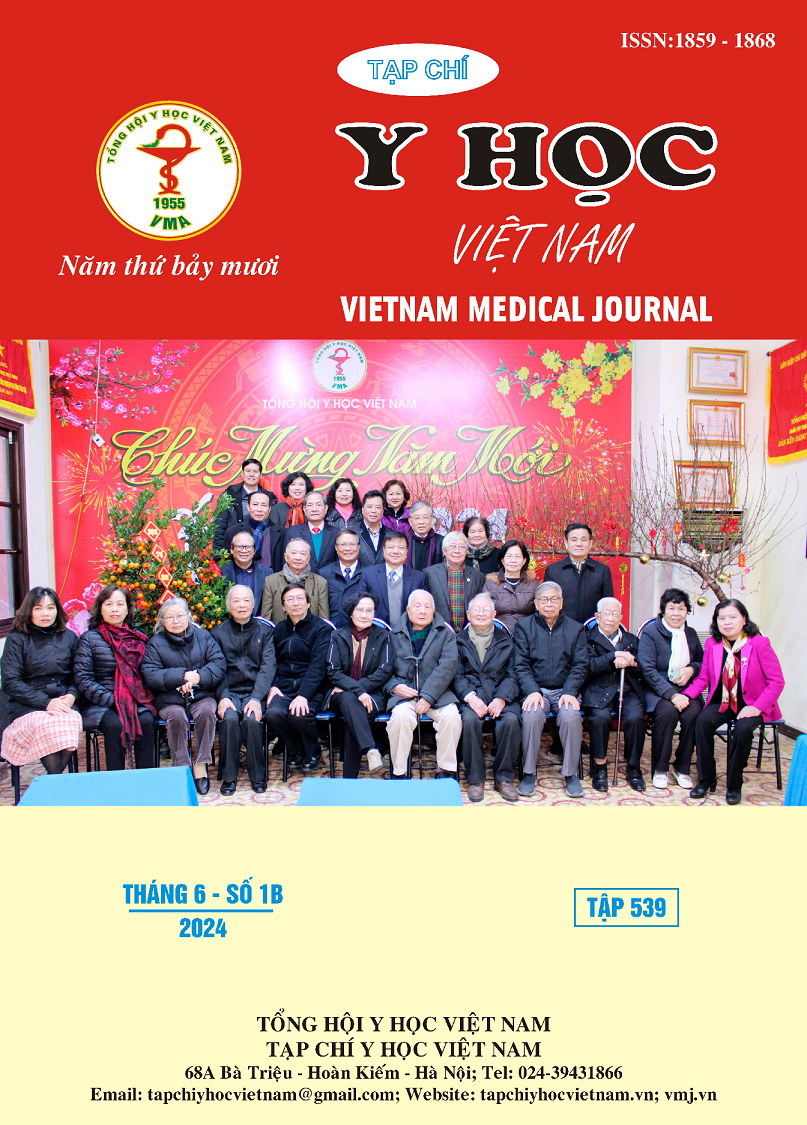KẾT QUẢ ĐIỀU TRỊ VÀ CÁC YẾU TỐ TIÊN LƯỢNG TỐT SAU LẤY HUYẾT KHỐI Ở BỆNH NHÂN TẮC M2 ĐƠN ĐỘC
Nội dung chính của bài viết
Tóm tắt
Mục tiêu: Tìm ra tỷ lệ kết cục điều trị, và các yếu tố tiên lượng sự độc lập về chức năng ở thời điểm 3 tháng sau khi can thiệp lấy huyết khối đối với các bệnh nhân đột quỵ thiếu máu não do tắc nhánh M2 đơn độc. Đối tượng và phương pháp nghiên cứu: Nghiên cứu hồi cứu, mô tả cắt ngang 52 bệnh nhân tại Trung tâm Đột Quỵ - Bệnh viện Bạch Mai từ năm 2021 - 2022. Bệnh nhân đột quỵ thiếu máu não do tắc M2 được điều trị lấy huyết khối, có thể kết hợp thêm tiêu sợi huyết hoặc không tiêu sợi huyết đường tĩnh mạch. Mục tiêu tiên phát là tìm ra tỷ lệ kết cục lâm sàng tốt (mRS 0-2). Phân tích hồi quy đa biến được thực hiện nhằm tìm ra các yếu tố tiên lượng kết cục tốt ở thời điểm sau 3 tháng. Kết quả: 52 bệnh nhân được tuyển chọn (gồm 25 nam (48,1%), tuổi trung vị là 68 (60-76)). Điểm trung vị NIHSS và ASPECTS lúc thời điểm nhập viện lần lượt là: 12 (9-15) và 7 (6-8). Tỷ lệ bệnh nhân được điều trị lấy huyết khối cơ học kết hợp với tiêu sợi huyết đường tĩnh mạch là 14 bệnh nhân (26,9%). Sau 3 tháng, 31 bệnh nhân (59,6%) đạt kết cục lâm sàng tốt (mRS 0-2). Phân tích đa biến chỉ ra rằng tái thông thành công (mTICI 2b-3) liên quan độc lập với kết cục lâm sàng tốt ở thời điểm sau 3 tháng (OR=51,33; 95% KTC: 3,81-691,02; p=0,003). Kết luận: Trong nghiên cứu, tỷ lệ kết cục lâm sàng tốt là 59,6% ở bệnh nhân đột quỵ thiếu máu não do tắc M2 được lấy huyết khối cơ học. Tái thông thành công (mTICI 2b-3) là yếu tố tiên lượng độc lập tới kết cục lâm sàng tốt sau 3 tháng.
Chi tiết bài viết
Từ khóa
Yếu tố tiên lượng, đột quỵ thiếu máu não do tắc M2, can thiệp nội mạch lấy huyết khối cơ học.
Tài liệu tham khảo
2. Powers WJ, Rabinstein AA, Ackerson T, et al. Guidelines for the Early Management of Patients With Acute Ischemic Stroke: 2019 Update to the 2018 Guidelines for the Early Management of Acute Ischemic Stroke: A Guideline for Healthcare Professionals From the American Heart Association/American Stroke Association. Stroke. 2019;50(12): e344-e418. doi:10.1161/ STR.0000000000000211
3. Xu Y, Fu W, Wang Y, Bi Q, Wang Q, Yang L, Zhang Q and Wang F (2023). Endovascular treatment for acute M2 occlusion stroke within 6 hours-a retrospective real-world evidence. Front. Cardiovasc. Med. 9:1063078. doi: 10.3389/fcvm. 2022.1063078.
4. Chamorro Á, Blasco J, López A, et al. Complete reperfusion is required for maximal benefits of mechanical thrombectomy in stroke patients. Sci Rep. 2017;7:11636. doi:10.1038/s41598-017-11946-y
5. Von Kummer R, Broderick JP, Campbell BCV, et al. The Heidelberg Bleeding Classification: Classification of Bleeding Events After Ischemic Stroke and Reperfusion Therapy. Stroke. 2015; 46(10): 2981-2986. doi:10.1161/STROKEAHA. 115.010049
6. Menon BK, Hill MD, Davalos A, Roos YBWEM, Campbell BCV, Dippel DWJ, Guillemin F, Saver JL, van der Lugt A, Demchuk AM, Muir K, Brown S, Jovin T, Mitchell P, White P, Bracard S, Goyal M. Efficacy of endovascular thrombectomy in patients with M2 segment middle cerebral artery occlusions: meta-analysis of data from the HERMES Collaboration. J Neurointerv Surg. 2019 Nov;11(11):1065-1069. doi: 10.1136/neurintsurg-2018-014678. Epub 2019 Apr 11.
7. Khan M, Goddeau RP Jr, Zhang J, Moonis M, Henninger N. Predictors of Outcome following Stroke due to Isolated M2 Occlusions. Cerebrovasc Dis Extra. 2014 Mar 7;4(1):52-60. doi: 10.1159/000360075.
8. Kniep H, Meyer L, Broocks G, Bechstein M, Guerreiro H, Winkelmeier L, Brekenfeld C, Flottmann F, Deb-Chatterji M, Alegiani A, Hanning U, Thomalla G, Fiehler J, Gellißen S; German Stroke Registry – Endovascular Treatment (GSR – ET). Predictors of functional outcome after thrombectomy for M2 occlusions: a large scale experience from clinical practice. Sci Rep. 2023 Oct 31;13(1):18740.


